The Unprecedented Rise of Mobile Morgues
When the unthinkable happens, our communities need practical solutions that balance technical needs with human dignity. That's exactly what happened when freezer trucks used as morgues became a necessary reality during the COVID-19 pandemic.
These refrigerated trailers—normally used to transport everything from ice cream to fresh produce—transformed into essential infrastructure as traditional morgues reached capacity. What began as an emergency measure has taught us valuable lessons about disaster preparedness and respectful care for the deceased during crisis situations.
Here's what you should know about these temporary morgue solutions:
- Purpose: Temporary, dignified storage when permanent facilities are overwhelmed
- Deployment: First widely used in NYC March 2020, later across Texas, Arizona, and other hotspots
- Capacity: Most units accommodate 40-56 deceased individuals depending on configuration
- Current Status: Some remain in use despite pandemic decline
- Cost: Approximately $7,000 weekly including maintenance and fuel
When COVID-19 deaths surged in early 2020, medical examiners and hospital administrators faced an overwhelming challenge. Where could they store the mounting number of deceased with dignity while waiting for funeral homes to catch up? The answer came from an unexpected source—the food transportation industry.
New York City's experience highlights the scale of need. FEMA delivered 85 refrigerated trailers at the height of the crisis. By May 2021, approximately 750 bodies remained in storage at the 39th Street Pier in Brooklyn. Similar scenarios unfolded across the country, from Bexar County, Texas to Maricopa County, Arizona.
"Though our forensic pathologists and everybody at the medical examiner's office deals with death everyday, it's obviously difficult for us to see this many deaths from a single event," shared Natalia Derevyanny, a Cook County spokeswoman, capturing the emotional weight felt by those working on the frontlines.
I'm with American Mortuary Coolers, where we've helped medical examiners and funeral homes implement both permanent and temporary cold storage solutions throughout the pandemic. Our team has provided guidance on crucial aspects like temperature control, respectful body handling protocols, and thorough decontamination procedures—all essential when freezer trucks used as morgues become necessary during mass-fatality events.
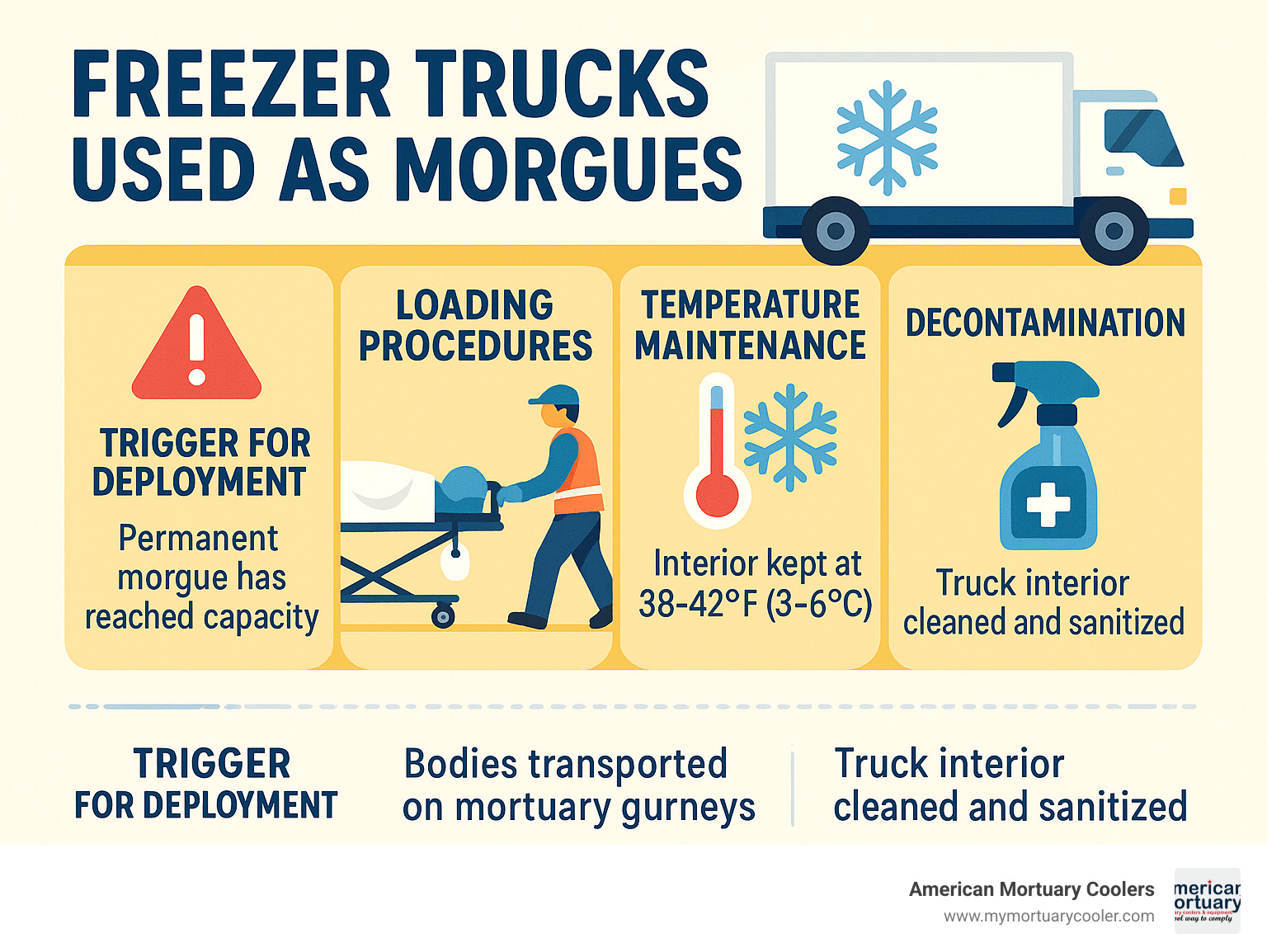
These emergency solutions connect to our broader expertise in mortuary refrigeration. If you're interested in learning more about permanent solutions, you might find our resources on mortuary chambers, funeral home refrigeration, and walk-in body refrigerators helpful for understanding the full spectrum of options available.
How Freezer Trucks Became Morgues
When the COVID-19 pandemic hit New York City in March 2020, a haunting image became seared into our collective memory: white refrigerated trailers lined up outside hospitals, serving a purpose far different from their usual cargo. While freezer trucks used as morgues weren't a new concept—they had been deployed after Hurricane Katrina and the 9/11 attacks—the pandemic marked the first time they were needed on such a massive, nationwide scale.
"Every disaster has its images, its symbols. For COVID-19, it might just be the refrigerator truck," wrote one emergency room doctor in The Washington Post, capturing the grim reality that defined the crisis.
The Federal Emergency Management Agency (FEMA) quickly deployed 85 refrigerated trailers to New York City alone as morgues reached capacity. For trailer suppliers, the shift was jarring. Keith Futerman, a director of sales for a refrigerated trailer company, found himself overwhelmed: "Who knows what they're doing. I get so many calls I've just got to pump out the quotes."
The First Wave in New York City
By early April 2020, New York City was recording over 800 COVID-19 deaths daily—a staggering number that overwhelmed existing morgue capacity. Outside Bellevue Hospital in Manhattan, the stark image of workers in protective gear using forklifts to load body bags into refrigerated trailers became a symbol of the pandemic's severity.
"Long term storage was created at the height of the pandemic to ensure that families could lay their loved ones to rest as they see fit," explained Mark Desire, spokesman for the Office of Chief Medical Examiner.
The city established a major temporary morgue at the 39th Street Pier in Brooklyn, which eventually held approximately 750 bodies. For those who remained unclaimed or whose families couldn't afford burial, the city offered interment on Hart Island, New York City's historic potter's field.
As the crisis continued, the medical examiner's office shortened the holding period for unclaimed remains from 30 to 14 days. However, they continued working with families "with sensitivity and compassion" on a case-by-case basis, recognizing the extraordinary circumstances families faced during this time.
Spread to Texas and Arizona
By summer 2020, as New York's initial wave subsided, the virus surged across the South and West. Texas and Arizona were particularly hard hit, forcing local officials to implement similar emergency measures.
In San Antonio and Bexar County, Texas, officials secured five refrigerated trailers, each capable of storing up to 180 bodies. Dr. Ken Davis of Christus Santa Rosa Health System didn't mince words about the dire situation: "In a hospital, there are only so many places to put bodies... We're out of space, and our funeral homes are out of space, and we need those beds. So, when someone dies, we need to quickly turn that bed over."
The situation in Arizona was equally grim. Maricopa County, which includes Phoenix, brought in 14 cold storage containers as its medical examiner's office approached 96% capacity. Officials kept six containers in reserve, creating space for an additional 294 decedents if needed.
Smaller communities faced similar challenges. In Nueces County, Texas, the fixed morgue building could only hold 12 bodies—woefully inadequate for the surge they faced. Dr. Adel Shaker, the county medical examiner, secured a FEMA trailer with capacity for an additional 40 bodies.
"We have seen very few deaths for the first few months of the pandemic, so the FEMA trailer was placed in another city," Dr. Shaker explained. "But the need is here now."
As the virus spread, neighboring counties began sharing freezer trucks used as morgues to manage fluctuating demand. Nueces County Judge Barbara Canales put it bluntly: "People have to understand how real it is."
The pandemic revealed how quickly our existing systems can be overwhelmed, highlighting the critical importance of emergency mortuary planning and flexible cold storage solutions—something we at American Mortuary Coolers understand deeply through our work supporting funeral homes and medical examiners nationwide.
Timeline & Numbers: From Peak to Present
The story of freezer trucks used as morgues follows the pandemic's grim waves across America. When COVID-19 hit New York City in early April 2020, the daily death toll was staggering – averaging 566 lives lost, with some days climbing above 800. City officials found themselves maintaining between 500-800 bodies in cold storage facilities at any given time, a situation that continued for months.
As spring turned to summer, the crisis shifted to new regions:
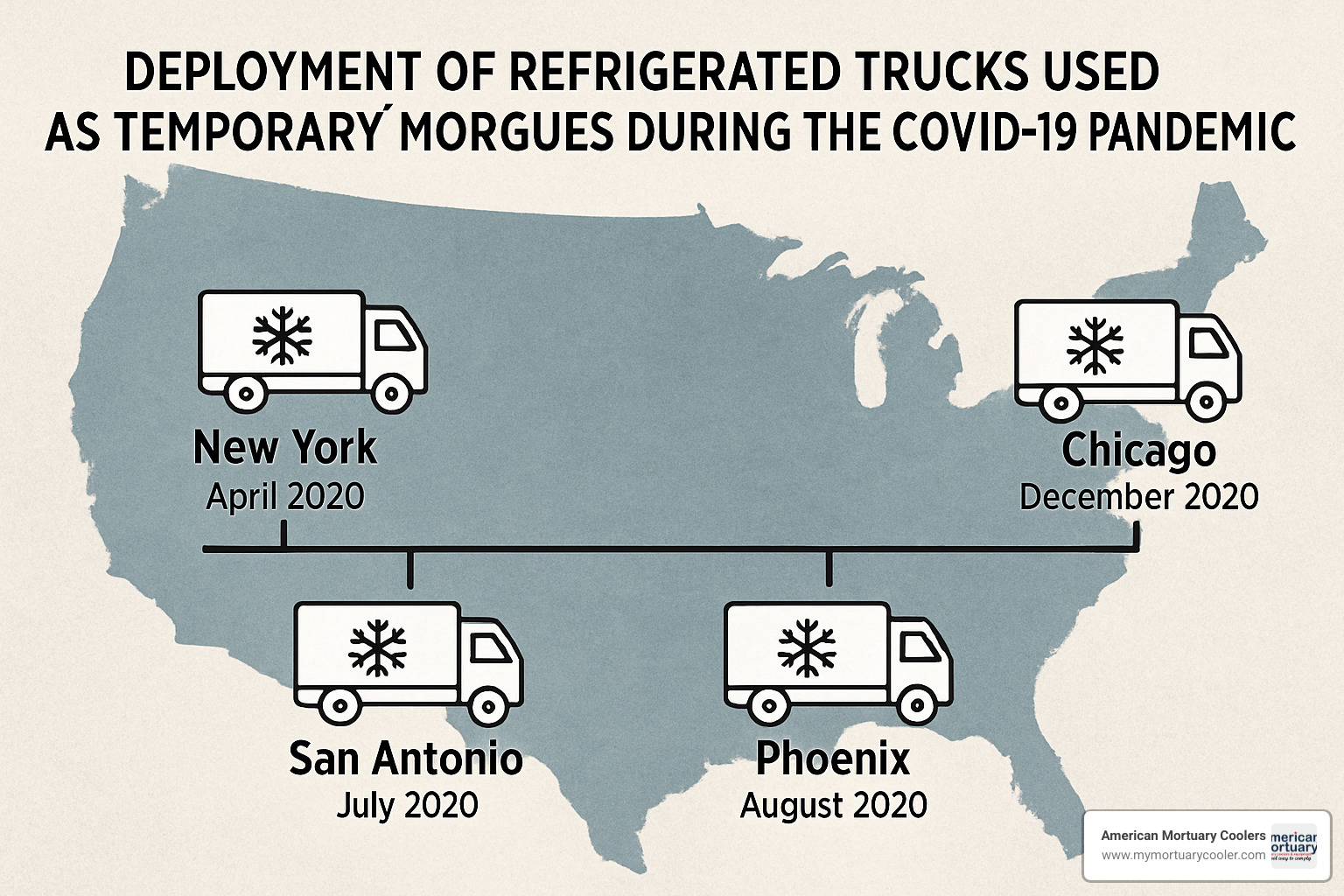
By July 2020, Texas was recording 129 deaths in a single day. Families and funeral directors struggled to keep pace with the mounting losses. Around the same time, Arizona's healthcare system groaned under pressure as ICU bed usage jumped from 62% to a dangerous 90% in just three months.
The impact on morgue capacity was immediate. Maricopa County's facilities reached 96% capacity that July, while Cook County's morgue pushed past 85% full after counting 351 COVID-19 deaths. Behind each percentage point were real people – parents, spouses, children – whose remains needed dignified handling despite the overwhelming numbers.
Even as vaccines arrived in 2021 bringing hope, the aftermath continued. New York City was still storing approximately 750 bodies at their Brooklyn pier facility well into the year. By 2024, many jurisdictions have thankfully phased out emergency morgue facilities as death rates declined, though some remain in limited use for unclaimed remains.
Why Some Bodies Remain in Storage
The extended use of freezer trucks used as morgues reflects more than just the virus's deadly toll – it reveals the pandemic's deeper social wounds.
"This additional storage capacity gave the families the time they needed to make final disposition arrangements," explained Mark Desire from New York's medical examiner's office, highlighting the human side of these clinical facilities.
Financial hardship became a major factor keeping bodies in storage. Many families who lost breadwinners to COVID also lost their ability to afford funeral expenses. The average cost of a funeral – typically $7,000-$12,000 – became an impossible burden for many grieving families already struggling with pandemic-related job losses.
Funeral homes themselves were overwhelmed, creating backlogs even as death rates began to decline. Some victims sadly had no next of kin or couldn't be properly identified, becoming "unclaimed remains" in the system. Others had family overseas who faced travel restrictions, making it impossible to transport their loved ones home.
New York City eventually shortened its holding period for unclaimed remains from 30 to 14 days, though officials worked compassionately with families case-by-case. For those who remained unclaimed, burial on Hart Island became their final resting place.
The financial strain wasn't just on families. Local governments paid approximately $7,000 weekly per 53-foot trailer – a significant expense for cities and counties already facing pandemic-stretched budgets.
Federal & State Roles
When local resources became overwhelmed, federal agencies stepped in. FEMA deployed refrigerated trailers to COVID hotspots nationwide and provided crucial funding through Public Assistance grants that helped communities manage the unprecedented crisis.
The Department of Health and Human Services activated specialized teams – the National Disaster Medical System's Disaster Mortuary Operational Response Teams (NDMS-DMORT) – bringing expertise in fatality management when local systems were overwhelmed.
State health departments became coordinators, sometimes shuffling resources between counties as needs shifted. In Texas, neighboring Cameron and Hidalgo counties found themselves sharing a single refrigerated trailer as the death toll fluctuated between their communities.
"We know some funeral homes are already at capacity in their morgues, so we want to be prepared in case we have to keep bodies for a longer period of time," explained Fields Moseley, a Maricopa County spokesperson, highlighting the careful planning behind these difficult decisions.
This devastating experience has led to valuable scientific research on emergency mortuary capacity, which is now informing better protocols for handling future mass fatality events – knowledge we hope is rarely needed but must be preserved.
Inside a Mobile Morgue: Logistics & Operations
When a refrigerated truck transforms into a temporary morgue, it enters a world of precise logistics and careful protocols. These mobile units maintain a chilly -4°C (25°F) – the ideal temperature to preserve remains with dignity while preventing decomposition. Behind this simple number lies a complex operation requiring constant power, usually from diesel generators that need regular attention and refueling.
The change of these trailers is remarkable. Standard food transport vehicles become solemn spaces through the addition of specialized shelving systems. A typical 53-foot trailer, once reconfigured, can respectfully hold between 40-56 individuals depending on the shelving arrangement.
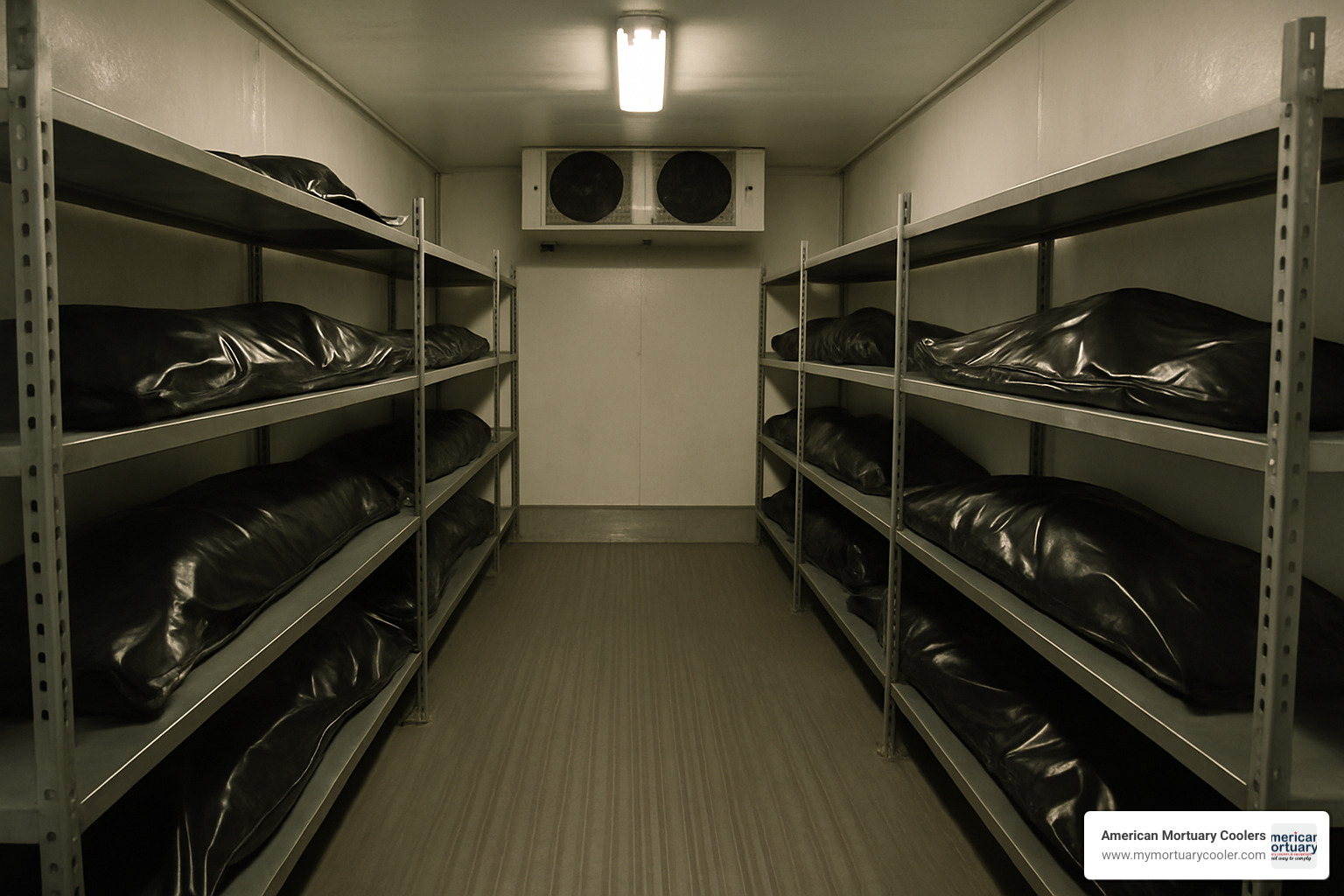
The human element remains central despite the industrial setting. "Bodies are placed face up inside a waterproof bag with nylon straps," explained one logistics coordinator I spoke with. Workers dressed in full personal protective equipment use forklifts to carefully move the deceased in and out of these temporary sanctuaries. Throughout this process, hospital bracelets or government IDs stay affixed to each body bag, sometimes supplemented with paint pen markings for additional identification.
As Mark Desire from New York's medical examiner's office beautifully put it, "With sensitivity and compassion, we continue to work with individual families on a case-by-case basis during their period of mourning." Even in crisis, preserving human dignity remains the priority.
Triggers for Deployment—When Is a Truck Ordered?
Counties and hospitals don't make the decision to deploy freezer trucks used as morgues lightly. Most facilities have established an 85% capacity threshold – when a permanent morgue reaches this level, it's time to call for mobile support. This buffer provides crucial time for delivery and setup before the permanent facility becomes overwhelmed.
Decision-makers watch several warning signs closely. Rising ICU occupancy rates above 90% often signal the need for preparation, as deaths typically follow several weeks after intensive care admissions. When funeral homes report they're reaching capacity, it creates a ripple effect that quickly impacts medical examiner offices. Sustained increases in daily death counts trigger emergency planning, though the county medical examiner always makes the final call based on current capacity and projected needs.
Marcy Flanagan, Executive Director of Public Health in Maricopa County, explained the bottleneck effect: "If there's nowhere to release them to, i.e. a funeral home, then that's when we have to start storing bodies longer than we're typically storing bodies at the medical examiner's office."
Some communities prepare well in advance. As Dr. Donnie Linder, Linn County Medical Examiner, shared: "We are prepared for mass fatalities, hoping that that doesn't happen. We have a good system with our funeral homes, our hospital leadership, our county leadership, that if needed, we could deploy mobile refrigerated morgue with attendants and security."
Cleaning, Conversion & Return to Service
When a refrigerated trailer completes its solemn duty, it undergoes an intensive change before potentially returning to commercial service. The FDA provides strict guidelines for this process, especially for units that might transport food again.
The decontamination journey is thorough and meticulous. First comes a deep soak with sanitizer-soap solution, followed by pressure washing with water heated to a sterilizing 185°F. Trained technicians inspect every surface for residue or damage before applying appropriate disinfectants to each surface type. Finally, they verify no lingering odors remain – a critical step for both practical and psychological reasons.
The FDA is clear about when a trailer should not return to food service: if interior surfaces directly contacted blood or bodily fluids, if surfaces are porous or damaged, or if odors persist despite cleaning efforts.
Some transportation companies hesitate to offer their trailers for morgue use, concerned about their brand's perception. Richard Durst, CEO of Arctic Express, was straightforward: "I think I would have to say no unless they came with a check and wanted to be the new, proud owner of that reefer trailer."
For healthcare facilities and funeral homes seeking more information about temporary morgue refrigeration options, detailed guidance is available at More info about mobile chill, where you'll find specifications about different mobile solutions designed specifically for dignified temporary storage.
Emotional, Ethical & Cultural Dimensions
When freezer trucks used as morgues began appearing outside hospitals, they became more than just practical solutions—they became powerful symbols of loss that touched hearts nationwide. For families already grieving, learning that their loved one was being stored in what was essentially a shipping container added another layer of pain to an already unbearable situation.
"The hardest part was knowing my father wasn't resting in a proper place," shared Maria Rodriguez, who lost her father in April 2020. "We couldn't visit, couldn't say goodbye properly. He was just... in a truck."
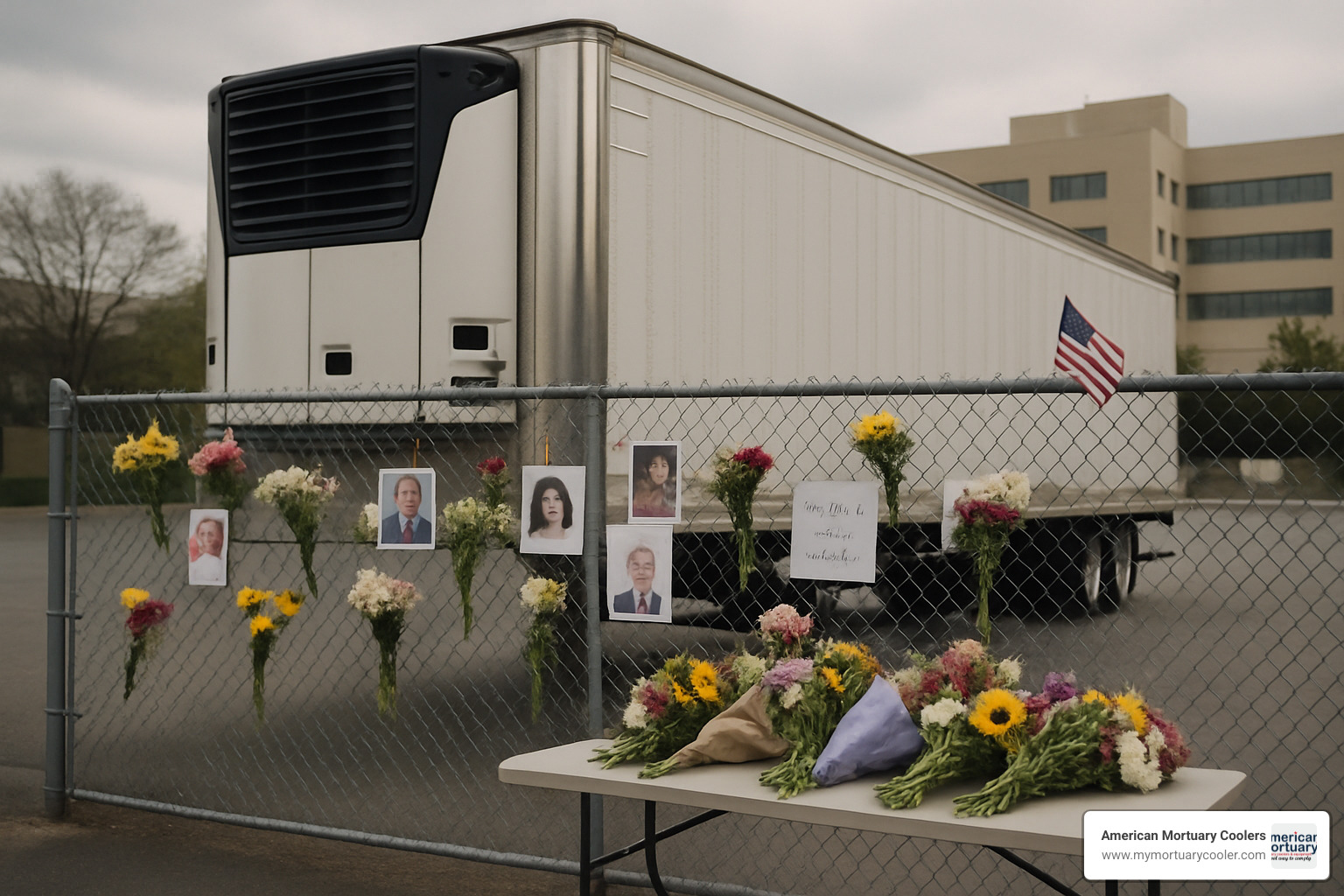
Despite these harsh realities, medical examiners and mortuary staff worked tirelessly to preserve dignity in death. Bodies were carefully identified with hospital bracelets, respectfully wrapped, and handled with reverence—even as the systems were overwhelmed. In many communities, touching memorials sprouted near these trailers, with flowers, photos, and handwritten notes left by those who couldn't say goodbye through traditional funerals.
Community Impact & Mental Health
The sight of freezer trucks used as morgues affected entire communities, creating ripples of collective grief that extended far beyond those who lost loved ones directly.
For healthcare workers, the daily reality was brutal. "I'll never forget the sound of the forklifts," said Nurse Theresa Collins from Bellevue Hospital. "Every day, moving bodies from our morgue to those trucks. It stays with you."
The mental health toll spread across various groups:
Hospital staff witnessed death at unprecedented rates while working to save lives Mortuary workers handled more bodies in weeks than they normally would in years Truck operators suddenly found themselves managing what were essentially mobile morgues Community members lived with constant visual reminders of death in their neighborhoods
Many hospitals quickly recognized the need for psychological support, establishing counseling services and rotation schedules to prevent burnout. Some facilities created special rituals—moments of silence or brief ceremonies—to acknowledge each person who passed, helping staff process the overwhelming loss.
"We're trained to save lives," said Dr. Ramon Martinez, an ER physician in San Antonio. "When you're instead managing mass death and storage logistics, it breaks something inside you. We had to learn to care for each other as much as our patients."
Legal & Cultural Considerations
The pandemic forced painful compromises between emergency needs and deeply-held cultural traditions. Many families found themselves unable to honor religious practices that had guided their communities for generations.
Jewish and Muslim traditions typically call for burial within 24 hours. Hindu customs often involve specific cremation rituals. Indigenous practices frequently include community gatherings and specific ceremonial elements. All these traditions faced disruption when bodies needed to remain in cold storage for extended periods.
"We tried our best to accommodate religious needs," explained Rabbi Daniel Schwartz, who worked with New York City officials. "But when you have hundreds of bodies arriving daily, some compromises became unavoidable. The pain this caused families can't be measured."
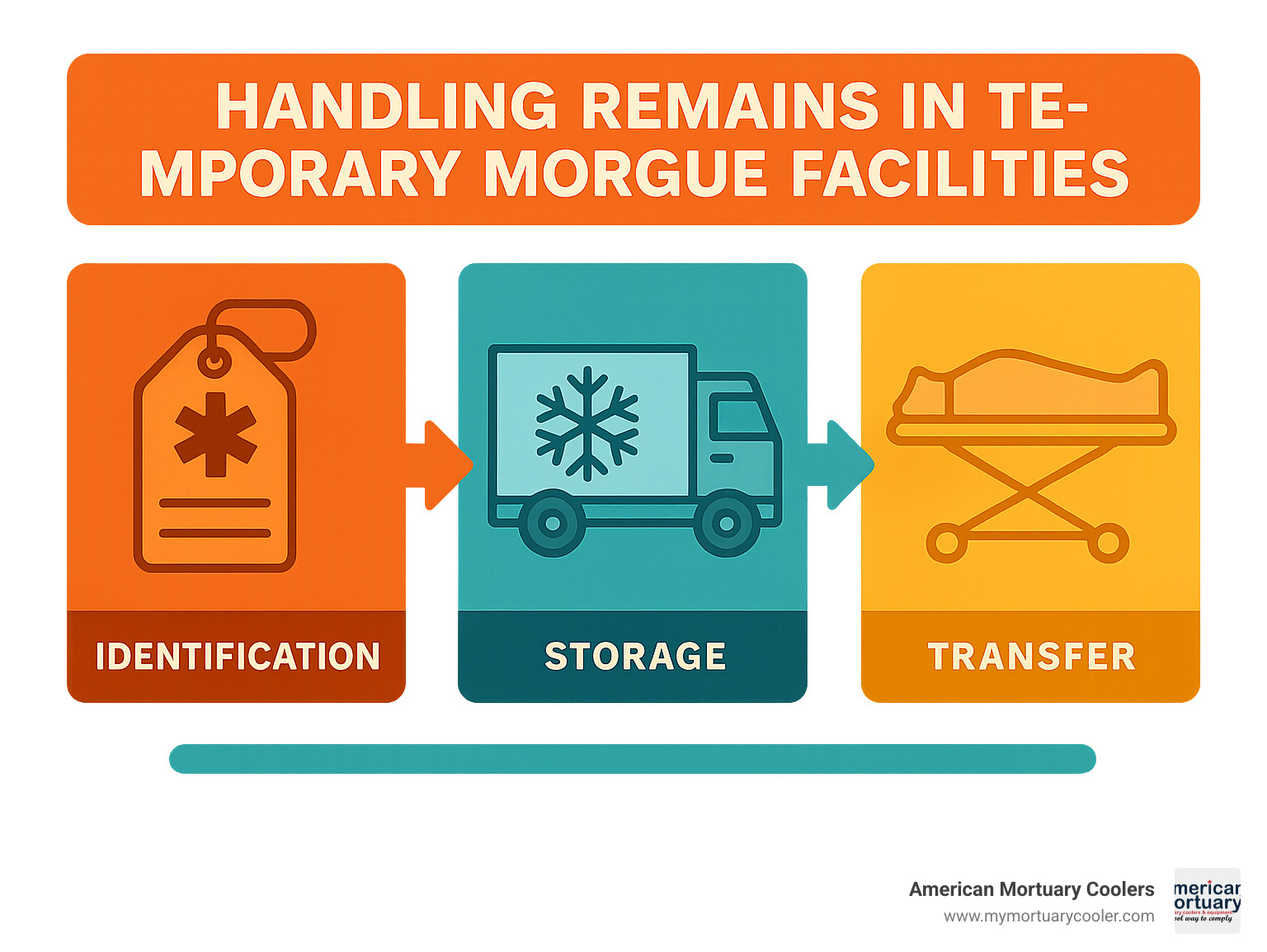
Legal questions emerged about informed consent and transparency. Families weren't always fully informed about where and how their loved ones' remains were being stored. Chain-of-custody documentation became critically important to ensure proper identification throughout the process—from hospital bed to temporary storage to final resting place.
Some communities responded by adapting their traditions. Virtual memorial services became common. Some religious authorities issued special dispensations recognizing the extraordinary circumstances. Family members created new rituals that honored their loved ones while acknowledging the realities of pandemic restrictions.
As Travis County spokesperson Hector Nieto said about their refrigerated morgue trailer: "Our hope is we never have to use it." This simple statement captured what so many felt—a recognition of necessary preparation paired with the profound hope that such measures would never be needed again.
Through all this difficulty, funeral directors, medical examiners, and healthcare workers demonstrated remarkable compassion, finding small ways to preserve humanity in the most trying circumstances—proving that even in our darkest moments, dignity and respect can endure.
Lessons Learned & Future Planning
The pandemic forced communities across America to confront a difficult reality: our systems for handling mass fatalities weren't prepared for what hit us. The widespread use of freezer trucks used as morgues taught emergency planners valuable lessons that are now being incorporated into disaster response frameworks nationwide.
I've spoken with dozens of county officials who've completely rethought their approach to morgue capacity. Many have invested in permanent morgue upgrades to avoid future reliance on temporary solutions. Others have taken a middle ground, purchasing modular container systems they can quickly deploy during emergencies while keeping them properly maintained during normal times.
At American Mortuary Coolers, we've noticed a significant shift in how facilities approach this planning. Hospital administrators who once considered morgue capacity an afterthought now recognize it as essential infrastructure. Our team has worked with clients across the Southeast, Southwest, and Northeast, each facing unique challenges based on their climate, population density, and existing resources.
As Dr. Donnie Linder, Linn County Medical Examiner, told me recently: "We are prepared for mass fatalities, hoping that that doesn't happen. We have a good system with our funeral homes, our hospital leadership, our county leadership, that if needed, we could deploy mobile refrigerated morgue with attendants and security."
Are Freezer Trucks Here to Stay?
When I talk with emergency planners today, they all ask the same question: are freezer trucks used as morgues just a pandemic anomaly or something we need to permanently include in our preparedness plans?
The evidence points clearly toward the latter. These mobile solutions are becoming standard equipment, though in a more formalized, purpose-built capacity than the hastily adapted food trailers we saw in 2020.
The math simply makes sense. Climate change is increasing the frequency of natural disasters that could cause mass fatalities. Public health experts warn that future pandemics remain a distinct possibility. And as any emergency manager will tell you, the cost of maintaining some emergency capacity is far lower than scrambling during a crisis.
I recently visited a county emergency management office where refrigerated trailers now sit alongside PPE and medical supplies in their pandemic preparedness stockpile. But there's been a shift toward purpose-built mobile morgue units rather than repurposed food transportation trailers.
"We learned that having the right equipment ready before a crisis is much more efficient than trying to adapt during one," an emergency management director in Texas explained as he showed me their new dedicated unit.
Innovations in Portable Morgue Technology
If there's one silver lining to the tragedy we experienced, it's that the pandemic accelerated innovation in portable morgue technology. The makeshift solutions of 2020 have evolved into sophisticated systems designed specifically for dignified care of the deceased.
The MERC System (Mortuary Improved Remains Cooling) represents one of the most significant advances – the first direct-contact liquid cooling system for human remains storage that's fully portable and scalable. I've seen this system deployed in under an hour, providing immediate relief to overwhelmed facilities.
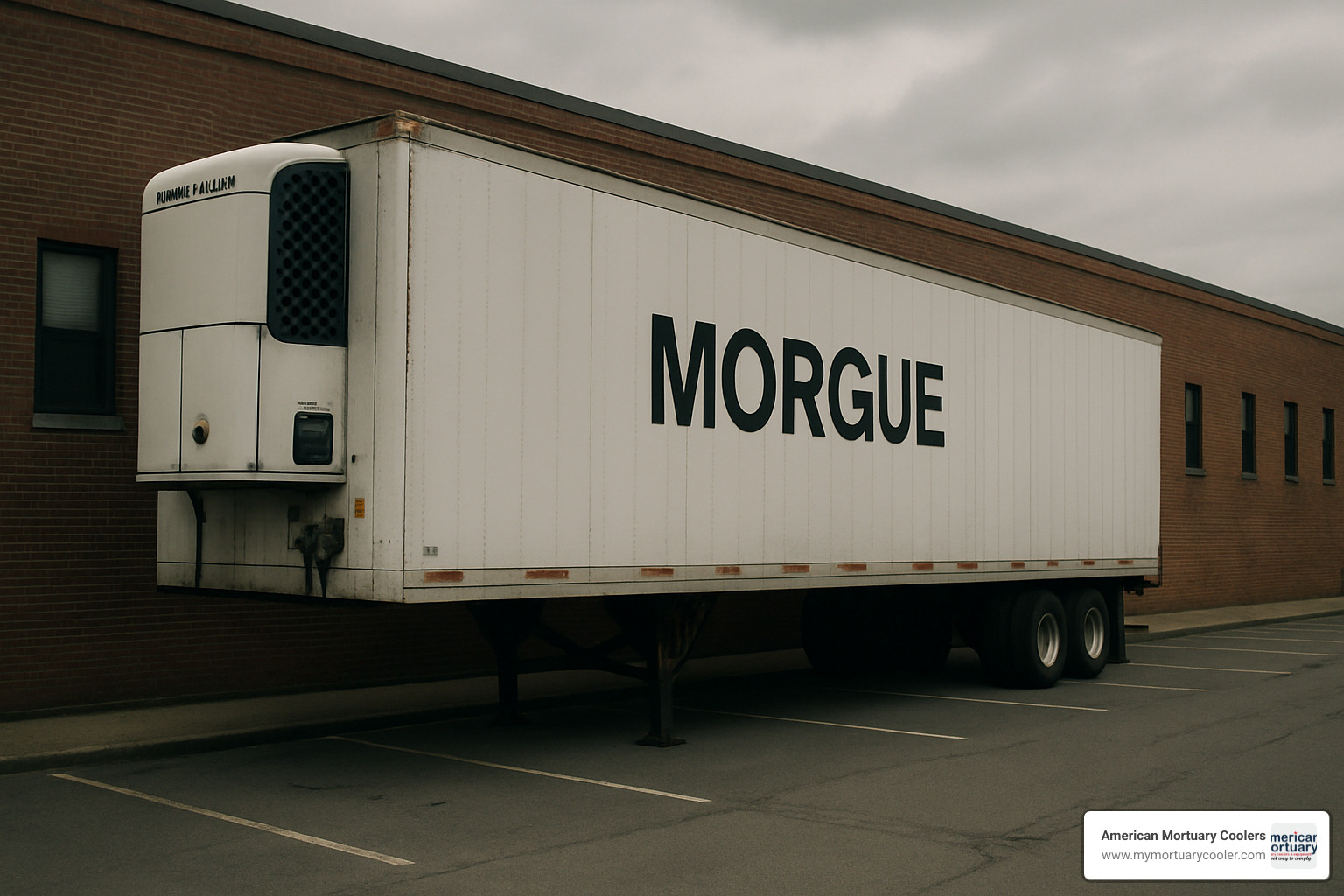
Other innovations include quick-deploy morgue racks that can be rapidly assembled with minimal hardware, solar-assisted refrigeration systems that reduce dependence on diesel generators, and purpose-built mobile morgue trailers designed specifically for respectful decedent storage rather than adapted from food transportation.
At American Mortuary Coolers, we've acceptd these advances while maintaining our commitment to dignity and respect. Our 3-body and 4-body upright mortuary coolers provide self-contained refrigeration with digital temperature controls, requiring only a standard 110V outlet. These units have become especially popular with rural counties, smaller hospitals, and funeral homes that need additional capacity without major infrastructure changes.
The technology has evolved, but our mission remains constant: helping communities handle difficult situations with dignity, efficiency, and respect. While we hope these systems are rarely needed, we take pride in providing solutions that bring peace of mind to those responsible for this essential but often overlooked aspect of public health.
For more information about the range of portable morgue options available today, visit More info about portable options.
Frequently Asked Questions about Freezer Trucks as Morgues
Why not build permanent morgues instead of using trailers?
When people first see images of freezer trucks used as morgues, they often wonder why we don't just build bigger permanent facilities. The answer comes down to practicality and economics.
Think about it like this: building a permanent morgue expansion for a once-in-a-century pandemic would be like buying a mansion just to host your extended family during the holidays. Most hospitals and counties carefully size their morgues for typical needs—not extraordinary circumstances.
A permanent morgue facility costs millions to construct and requires ongoing maintenance, staffing, and utilities. Meanwhile, refrigerated trailers can be rented only when needed for about $7,000 per week. This flexibility makes tremendous financial sense.
I've spoken with many county officials who appreciate how mobile solutions allow resources to be shared between regions as needs change. During COVID-19, we watched as trailers were moved from one county to another as hotspots shifted—something impossible with fixed facilities.
Fields Moseley from Maricopa County captured this thinking perfectly: "We know some funeral homes are already at capacity in their morgues, so we want to be prepared in case we have to keep bodies for a longer period of time."
How long can a body safely remain in a refrigerated truck?
This question comes up frequently, and the answer might surprise you. When properly maintained at temperatures around -4°C (25°F), a body can actually be preserved for several months in refrigerated storage.
That said, most medical examiners aim to transfer remains to funeral homes or final disposition within days or weeks whenever possible. It's about balancing practical considerations with respect for the deceased and their families.
New York City's experience during COVID-19 demonstrated that longer-term storage works when necessary. Some bodies remained in refrigerated storage at the Brooklyn pier facility for over a year while families made arrangements or remains were identified. This wasn't ideal, but it was handled with dignity and care.
Several factors determine safe storage duration:
- Maintaining consistent temperature without fluctuations
- Proper body preparation and protective packaging
- Regular monitoring and system maintenance
- Reliable power supply with backup generators
When these conditions are met, temporary facilities can provide respectful storage for extended periods when circumstances require it.
Can a truck that held bodies really carry food again?
Yes—but not without an extremely thorough decontamination process. This question touches on both practical and emotional concerns that many people share.
The FDA has created specific guidelines for returning refrigerated trucks to food service after morgue use. The process isn't simple: it includes thorough cleaning with specialized sanitizer-soap solutions, pressure washing with 185°F water, application of EPA-registered disinfectants, and meticulous inspection.
However, there are important exceptions. If interior surfaces had direct contact with blood or bodily fluids, or if surfaces are porous, damaged, or retain any odors, the FDA recommends against returning the unit to food service. Safety comes first.
Many transportation companies hesitate to rent their trailers for morgue use because of these concerns. Richard Durst, CEO of Arctic Express, put it bluntly: "I think I would have to say no unless they came with a check and wanted to be the new, proud owner of that reefer trailer."
At American Mortuary Coolers, we understand these concerns, which is why we've developed purpose-built solutions specifically designed for dignified temporary storage—equipment that never faces the question of being repurposed for food transport.
Conclusion
The COVID-19 pandemic brought freezer trucks used as morgues into our collective consciousness in ways none of us could have imagined. What started as an emergency response in New York City quickly became a necessary reality across America as communities faced overwhelming death tolls.
These refrigerated trailers tell a story about both vulnerability and resilience. They exposed critical gaps in our mortuary infrastructure while showcasing the remarkable adaptability of healthcare workers, funeral professionals, and emergency managers who maintained dignity in the most challenging circumstances.
"Every disaster teaches us something," says James Miller, a veteran emergency management coordinator. "This one taught us that caring for the deceased with respect is just as important as caring for the living with compassion."
Today, the lessons from those difficult days are reshaping how we prepare for mass fatality events. Purpose-built mobile morgue units have replaced hastily converted food trucks. Permanent facilities have expanded their capacity. New protocols ensure smoother operations during future crises.
At American Mortuary Coolers, we've listened to the frontline workers who managed this unprecedented situation. Their experiences have informed our approach to designing refrigeration solutions that balance practical needs with the sacred duty of caring for the deceased. Our Tennessee-built coolers now serve medical examiners, hospitals, and funeral homes across the country, delivering reliability when it matters most.
The pandemic reminded us all that proper end-of-life care isn't just about the technical aspects of preservation—it's about honoring human dignity even in extraordinary circumstances. By combining immediate solutions with thoughtful long-term planning, we can ensure that even during the darkest moments, we maintain the respect every person deserves.
Looking ahead, we see communities better prepared and more resilient. The painful lessons of these past years have strengthened our collective commitment to dignified care for the deceased, regardless of the challenges we face.
For more information about morgue coolers and refrigeration solutions that meet these evolving needs, visit More info about morgue coolers.



















